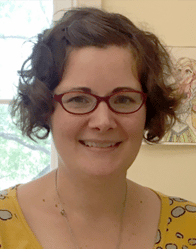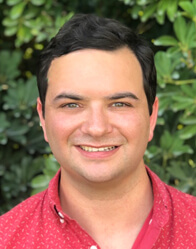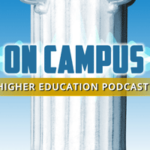Season 1 – Episode 18: Accommodations in Online Learning
The Americans with Disabilities Act (ADA) aims to make education more accessible for individuals with disabilities in both face-to-face and online courses. Tiffany Bailey, Director of Equal Opportunity and ADA Coordinator in Equal Opportunity and Compliance (EOC) at the University of North Carolina at Chapel Hill, discusses how online learning accommodations can vary from accommodations in face-to-face courses. Listen now or read the transcript below.
Episode Transcript
Click to expand/collapse
Darren Gaddis: From CITI Program, I’m Darren Gaddis and this is On Campus. Today, what are accommodations in an online learning environment? How are these accommodations potentially different than accommodations in a face-to-face class? And, how to create a more accommodating environment for all students?
Darren Gaddis: I spoke with Tiffany Bailey, the director of Equal Opportunity and Americans with Disabilities Act Coordinator and Equal Opportunity and Compliance at University of North Carolina, Chapel Hill.
Darren Gaddis: As a reminder, this podcast is for educational purposes only. It is not intended to provide legal advice or guidance. You should consult with your organization’s attorneys if you have questions or concerns about relevant laws and regulations discussed in this podcast. Additionally, the views expressed in this podcast are solely those of the presenter.
Darren Gaddis: Hi, Tiffany, how are you?
Tiffany Bailey: Thanks for having me. I appreciate it.
Darren Gaddis: Tiffany, to get us started today, in a really simple manner, what is an accommodation?
Tiffany Bailey: I would describe it as a modification or as something that we put in place to help address the impacts of a disability or medical condition in accessing the learning environment if you’re a student, or from an employee perspective, if you need an accommodation to meet the essential functions of your job.
Darren Gaddis: And with students in mind, Tiffany, taking that simple definition that you just provided us with, how can accommodations in an online course differ from accommodations in a traditional face-to-face course?
Tiffany Bailey: I do think that there are a lot of commonalities and types of accommodation requests, but I think we really have to as accessibility resource or disability service offices, and even as faculty and staff think about the different impacts a student might have engaging remotely. For example, a lot of requests that we received during the pandemic and then for remote learning, one of the common ones was the ability to turn off camera if a student was experiencing impacts or just as a matter of cause. Right? If you think about being in the classroom and that’s less of an issue where you may be sitting behind people, there might not be as many group activities. And we noticed that that was really triggering potentially for some students with various mental health conditions.
Tiffany Bailey: I think the other thing that we think about is how material’s presented in the online format of a remote mode. What does that mean? What technology are we using? Is it Zoom? Is it Canvas? Is it… Can’t remember all of the ones. Is there another platform? How are we conducting group work? So I think when you start kind of dissecting how the courses offered online are different than in person, you can imagine that that brings up some various challenges for students with disabilities, depending on the impact of their condition.
Tiffany Bailey: So I named kind of camera off, but if we’re thinking about real-time captioning, we do that in in-person course as well. So there are some commonalities. But ability to record, we’re getting more students requesting to record the class if it’s offered online, to be able to have that and review afterwards, or if a student is absent and they’re looking to have access to what was discussed in class, and the online class was recorded, having access to that, to help kind of bridge the gap and making up material that they missed from their absence, which was related to their disability.
Darren Gaddis: Tiffany, what advice do you have for students who have never taken an online course before to advocate for their right to an accommodation in an online course?
Tiffany Bailey: I think it is important for students first to know where to go, to request an accommodation specifically, and to go to the accessibility service or resource disability services. We have different names for the offices that have the same kind of function depending on the different institution, but to know where to go. One of the pieces that disability resource providers are trained to do is kind of talk with students about the structure of each of their course and talk more about the impacts that students might be experiencing due to disability. So they ask a lot of questions about that.
Tiffany Bailey: So I think that’s one of the things that students can think about is, how do I articulate what I’m experiencing, but also not feeling too much pressure to do that because the disability resource person can kind of work through that with you so that you can talk about here’s what I’m really having challenges with in this particular course modality. So I think it’s important to connect with the disability resource office early. And some students will also talk to their instructors as well, kind of about options, but formalized accommodations do need to go through the disability resource office. And I would encourage that as a first step.
Darren Gaddis: On the flip side of that, where can faculty and staff go to learn more about how to make an online course more accessible and accommodating for all students?
Tiffany Bailey: Absolutely. I think that is also the disability resource office. We are partners to students and partners to faculty as well. And that could be something, whether it be a student has already requested an accommodation and you’re wanting to understand how to facilitate this in the class to a student has expressed to you that they’re having challenges in the class. You’ve referred them to our office, our office being ARS or disability resources, but you want some further guidance on how to make the class most accessible to the particular student. So I think that that’s a great place to start.
Tiffany Bailey: Additionally, I’m a proponent of looking at universal design and instruction, which is the concept of creating classes that are usable and accessible to the most amount of people, regardless of how they choose to identify. When you design your course with accessibility in mind using universal design, you’re really kind of thinking about it more broadly. So not just disability, but also other types of circumstances as well in which flexibility might be needed. So, for example, a pregnancy accommodation or religious accommodation, other things that aren’t couched in accommodations, which could be a student who is a parent and is having difficulty juggling the schedule or a student who is a primary caregiver for one of their family members. So that just kind of allows for the most flexibility possible without people really having to say, hey, I need assistance here.
Darren Gaddis: Tiffany, what else do we need to know?
Tiffany Bailey: This work is ever-changing. When I started back in 2006 in disability and the disability world in an accessibility resource office, what an accommodation looks like about the types of requests or types of complexity and impacts of condition are really different than it is right now. And I think one of the things that I appreciated about COVID was that it pushed our universal design conversation a little bit more forward and also really encouraged instructors, or they were put in the place, I should say, to be examining their courses and thinking about accessibility as it pertained to many different people.
Tiffany Bailey: So I think from that perspective, it was really good. I think that now, after two years of COVID and we’re continuing here, what do accommodations look like in this realm, especially as it relates to people with disabilities who may have impacts of COVID or other things, or just generally of what was available during COVID times in terms of flexibility that might not be now, but that worked for students with disabilities. I also would say that the accessibility resource office or disability resource office is there to help. And so I would encourage people to reach out to them any chance that they get to kind of talk about an accommodation request if you’re a student or a faculty member. I think they’re a really critical resource on campus.
Darren Gaddis: Tiffany, thank you for joining me today.
Tiffany Bailey: Thanks so much.
Darren Gaddis: You may also be interested in CITI Program’s A 21st Century Approach to ADA Compliance: Equity and Access webinar. Please visit CITI Program’s website to learn more about all of our offerings.
How to Listen and Subscribe to the Podcast
You can find On Campus with CITI Program available from several of the most popular podcast services. Subscribe on your favorite platform to receive updates when episodes are newly released. You can also subscribe to this podcast, by pasting “https://feeds.buzzsprout.com/1896915.rss” into your your podcast apps.
Recent Episodes
- Season 1 – Episode 17: Instructional Designer for Online Learners
- Season 1 – Episode 16: Leading an Academic Department
- Season 1 – Episode 15: Student Privacy: Higher Education
- Season 1 – Episode 14: Monkeypox: What Higher Education Institutions Need to Know
Meet the Guest

Tiffany Bailey, MS – University of North Carolina, Chapel Hill
Tiffany Bailey serves as the University’s Director of Equal Opportunity and Americans with Disabilities Act (ADA) Coordinator in Equal Opportunity and Compliance (EOC). In this role, Tiffany is responsible for overseeing the University’s compliance efforts including policies and procedures that address the ADA and federal and state regulations.
Meet the Host
Darren Gaddis, Host, On Campus Podcast – CITI Program
He is the host of the CITI Program’s higher education podcast. Mr. Gaddis received his BA from University of North Florida, MA from The George Washington University, and is currently a doctoral student at Florida State University.







